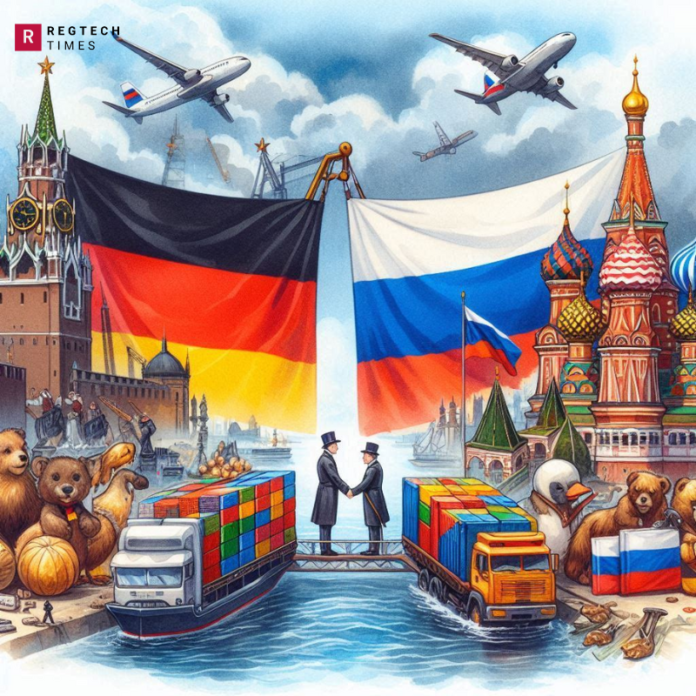In February 2022, Russian forces invaded Ukraine. Soon after, a company named Hellmann Worldwide Logistics, which is based in Germany, decided to stop doing business in Russia. Hellmann’s Moscow office used to help Russian companies get tools, parts, and equipment from Western countries. But after the invasion, many shipments were stopped due to international sanctions. These sanctions are rules that prevent countries from trading with Russia to punish them for the invasion.
A New Opportunity for Business
When Hellmann left Russia, some of its employees saw a chance to start their own business. They formed a new company called Heinrich Tapp Rus, or HT Rus. This new company took over Hellmann’s old clients and continued to help Russian companies get the things they needed. HT Rus used a method called “parallel imports.” This means they shipped goods to Russia through other countries like Turkey or the United Arab Emirates to avoid the sanctions.
Who HT Rus Helped
HT Rus helped several important Russian companies, even those under sanctions. Some of their clients included:
- Aurus: This company makes luxury cars used by Russian leaders, including President Vladimir Putin.
- Kamaz: A big truck maker that also makes military trucks used in the war.
- Tyumen Battery Factory: A company that supplies batteries for weapons.
How They Did It
HT Rus’s business model was to act as a middleman. They took orders from Russian companies and arranged for the goods to be shipped through countries that didn’t have strict sanctions against Russia. This made it look like the goods were coming from places like Turkey, not directly from Germany or other Western countries.
Legal Issues
Under U.S. and EU laws, it’s illegal to help sanctioned companies. If a Western company is found to be helping a Russian firm on the sanctions list, they could also face penalties. This could make it difficult for them to do business internationally.
The Connection to Germany
HT Rus was owned by a German company named HT East Management. This company had a German businessman as a shareholder. The German customs officials, who enforce sanctions, said that German companies could be held responsible if their foreign subsidiaries break the rules.
HT Rus’s Activities
Documents showed that HT Rus made about $17.5 million in revenue last year. They provided services to Aurus, Kamaz, and Tyumen Battery Factory. These services were likely to help these companies get the parts and equipment they needed despite the sanctions.
Sanctioned Clients
HT Rus worked with several Russian clients who were placed under international sanctions. The Russian tax documents revealed that HT Rus provided services to these companies, helping them get around the restrictions imposed by Western countries.
EU Implements 14th Sanctions Package Against Belarus to Block Russia Sanctions Evasion
For instance, Aurus, the company that makes luxury cars used by Russian leaders, was one of their clients. Aurus was included on a U.S. sanctions list in February 2023 because its parent company is considered essential for Russia’s national defense and security. The sanctions mean that any company doing business with Aurus could also be placed under U.S. sanctions, making it hard for them to operate internationally.
HT Rus provided services to Aurus even after the sanctions were imposed. They conducted transactions worth $3,773 with Aurus, helping them continue their operations despite the restrictions.
Pasdaran Under Scrutiny: Germany Advocates for EU Sanctions
Another client was Kamaz, Russia’s biggest truck maker, which also manufactures military trucks. Kamaz was sanctioned by the U.S. and EU in June 2022 because its vehicles were used to transport Russian soldiers and missiles during the invasion of Ukraine. HT Rus provided services worth $290,725 to Kamaz and its subsidiaries, enabling them to get the parts they needed.
AO Proton, a maker of optical electronic equipment, was another client. AO Proton was placed under U.S. sanctions in May 2023. HT Rus provided services worth $26,156 to AO Proton after the sanctions were imposed. This company is known for its contributions to Russia’s military efforts.
HT Rus also worked with Tyumen Battery Factory, a company that supplies batteries for weapons. This company was placed under U.S. sanctions in December 2023. HT Rus provided services worth $312,000 to Tyumen Battery Factory, helping them continue their operations despite the restrictions.
Impact on International Relations
The actions of HT Rus and its German parent company, HT East Management, have raised concerns about the effectiveness of international sanctions. These sanctions are meant to punish Russia for its actions and pressure them to change their behavior. However, companies like HT Rus have found ways to circumvent these restrictions, allowing Russian companies to continue their operations.
Germany’s Opposition to EU Sanctions on Russian Gas: A Complex Interplay of Politics and Economics
The involvement of German companies in helping Russia evade sanctions has also strained relations between Germany and other Western countries. Germany is a key member of the European Union and a close ally of the United States. The discovery that German companies are involved in helping Russia evade sanctions undermines the unity and effectiveness of the international community’s response to Russia’s actions.
Germany helped Russia evade sanctions through companies like HT Rus. By setting up a new company and using “parallel imports,” former Hellmann employees found a way to continue doing business with Russia. This example shows how businesses can sometimes find ways around international rules, even when the intention is to stop them.


